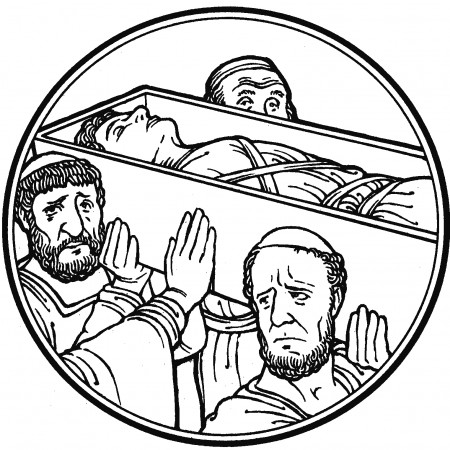The Sixteenth Sunday after Trinity
Luke 7:11–17
+ IN NOMINE IESU +
We get emotional at weddings not simply because we’re happy for the newly wed couple. This is part of it but not all of it. We get emotional at weddings because we think of our own weddings, those we’ve been in and a part of. We think of their joy and their promise of the future. We import our past, and even future, into the current event. In the same way, we get emotional at funerals not just because we mourn the loss of the one being buried. This is certainly part of it, but not all of it. We get emotional at funerals because we import that situation into our own lives. We think of those from our own family who have died, but also, and probably more so, we begin to consider that this could be us, that we could be burying our own loved ones, or our loved ones could be burying us.
And so it is that St. Luke records the raising of widow’s son at Nain. It’s a common human scene, a common human experience with common human emotions. Death has come to a boy, the only son of his mother, and she is a widow. This is not her first time in this role. She has been there before. The sheer weight of her sorrow could be felt by all who attended. And even though it is a common human experience with common human emotions, they, and we also, are never as ready for it as we think we are. It almost always takes us by surprise. The great crowd that is with her mourn with her. They weep even as she weeps. They feel her pain, not in the same way that she feels it, but they experience it nevertheless because death is common to us all.
The temptation here is to focus simply on the miracle, on how our Lord raises the young boy and gives him back to his mother. If we do this, we miss something even more important. And as great as the miracle is, something greater is at work: the impetus for Jesus raising the widow’s son. “And when the Lord saw her [the mother], he had compassion on her” (Luke 7:13). He has compassion. His heart bursts within His chest. How could he not? He, too, has a mother, who would be a widow, who would bury her own son. And so He stands in the way of the unyielding procession of death, between Nain and the cemetery, and it stops dead in its tracks. Jesus reached out and touches the bier. He spoke first to the boy and then to the mother. And did it because he had compassion upon her. And thus he gave the boy back to her.
Our Lord is not just God. He is also a man, flesh of our flesh, bone of our bone, experiencing joy as well as pain, suffering as we suffer, enduring as we endure. And He has compassion upon her. For he, too, sees in this mother His own. He understands her pain and sorrow. He feels it in his gut. And he is still a man. For when He was raised from the dead on the third day, he was raised as a man, as one of us. He ate fish on the shore. He bore the marks of the nails and the spear so that Thomas could believe. And when He ascended into heaven to sit at the right hand of the Father, he ascended as a man, as our brother in arms, our kinsman. He reigns on the eternal throne of God as a man, a man who knows sorrow and pain, who feels it in his body and heart and soul. As a man, He had compassion for the mother of the son of Nain. And as a man, he still has compassion upon us.
It is the compassion of the Lord that drives His command to the mother: “Stop weeping.” The present tense imperative is better translated “stop” than “don’t.” And in this scene it makes more sense. Her husband is dead and now her son is dead. She is weeping. The Lord’s gut aches within Him to behold the curse of Adam visited upon her and He commands it to stop. Why shouldn’t He? He has the authority to reverse death—not simply because He is Divine but because He is the Messiah who has taken on our flesh made mortal by sin and will submit to death as this boy’s substitute.
So He exercises His authority—the authority of the Substitute and Ransom. The Lord’s reaches out, His body touches the wood that carries the dead and makes him alive. He commands the boy to rise. The boy sits up and speaks and Jesus gives him back to his mother.
This doesn’t mean we should not weep for dead husbands and sons. It means rather that the Lord came to put a stop to death. He stops the sorrow of death by dying in the boy’s place. He doesn’t need to wait for it to be accomplished in time. It’s already done. The promises of God are never simply a matter of the future. Rather the promises of God are so true and sure that they deliver in time from eternity. What they promise they also give. The Lord’s course has been set since He cursed the serpent in the garden and set Himself, the seed of Eve, as enmity between the author of death and Eve’s descendants. Thus death has the guarantee of what it is owed, of what justice demands, in the flesh of Adam joined to the substance of God and it has no right to hold its prey. “Get up,” the Lord says and death lets go, the boy sits up and speaks, alive.
No one will interrupt the tears of the Lord’s widow mother on her way to Rome’s gallows outside Jerusalem or tell her to stop weeping for her son. We can only imagine the sorrow of the sword that pierces her heart as they unjustly and cruelly not only torture her Son to death but continue to mock and lie about Him, when HIs body touches the wood of the cross, He dies but in so doing, gives life to all those who believe.
But she will stop. She will stop weeping. She stops weeping when her Son rises from the dead and paves the way into Paradise for her and all believers in His death, resurrection, and ascension. The promise comes true and death lets go and the angels sing.
The Lord has not yet told us to stop weeping. Our dead have not been raised. Our tears still flow. But death is losing its grip. The angels holding back the destructive winds are eagerly waiting of the last Baptism. The choir is ready to sing. Our dead have preceded us to paradise but wait for their bodies and wait for us. Death is dying. It can’t have them. It can’t have us. It had Jesus instead, and like new wine in old wineskin He ruined it forevermore. They will rise. So will we. All the dead will rise and whether it is commanded explicitly or not, we will stop weeping. We will follow Jesus out of the grave and the Father’s side and join the holy angels in the holy song of praise.
Even now we sing. But not the song of Nain. We do not sing “A great prophet has risen among us.” Rather our song is the song of the holy angels at the tomb: “Jesus of Nazareth who was crucified is risen form the dead.” Death makes the living silent and weep. But life out of the grave makes the dead rejoice and sing. For the body of the Lord now touches you, and gives life.



0 Comments